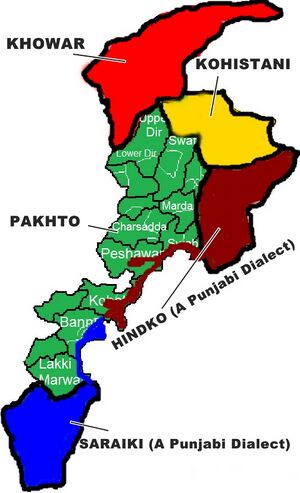Swabi

Swabi is a district in the Khyber Pakhtunkhwa province of Pakistan.
Location
It lies between the Indus and Kabul Rivers.
Origin of name
Jat Gotras
Tahsils
History
Once part of the Gandhara civilization, Swabi contains many important archaeological sites, which are tourist attractions. Alexander the Great crossed the Indus River where the village of Hund now lies on its right bank. Hund is an archaeological treasure; it was the capital of the Hindu Shahi for nearly three hundred years.
Rani Ghat is another Gandhara archaeological site, containing the ruins of a famous palace belonging to the queen of that era. She was famous for paying Swabi villagers for clean air—they were not allowed to pollute it by winnowing their crops. The ruins on the top of a mountain still attract visitors. As a part of the origin of the Buddhist Gandhara civilisation, it has also garnered re-construction funds from Japanese research institutes. With the help of this money, the local non-governmental organization Shewa Educated Social Workers Association built a walkway to the historical sites, as well as fences to protect the area. It also built a rest house on Baga Mountain. This area attracts many tourists, including Japanese who come here to learn about Buddhism in ancient times.
Aurel Stein recorded in his survey of the Mahaban range "it remains for me to explain the opinion to which I have been led as regards the character and identity of this remarkable site. The nature of the ruins described and the remains they have furnished, makes it clear beyond all doubt; that they mark the position of a Buddhist sanctuary possessed of shrines and monastic establishments.[1]
Streams and rivers
Pakistan biggest dam tarbela dam is located in Haripur district which touches the topi union council. Swabi is home to several great rivers, the Indus, the Kabul Rivers. There are also several smaller streams. For example Badrai, originating from Buner crossing Salim Khan, Manerai, Swabi, Kala, Darra, Panjpir, Zaida and so on until it meets the Indus river near Ambar. Maini has a stream; the water emerges from the centre of the village. It is used for irrigation. This stream is called china in the local language, meaning "spring". They all have natural springs called china in Maini, chino in Kotha and bayin in Topi.
Notable persons
External Links
References
- ↑ Report of archaeological survey work in the North-West Frontier Province By Sir Aurel Stein Page 38
Back to Jat Places in Pakistan

